Big Red Book
Celebrating television's This Is Your Life
Earl MOUNTBATTEN of Burma KG, PC, GCB, OM, GCSI, GCIE, GCVO, DSO, FRS (1900-1979)
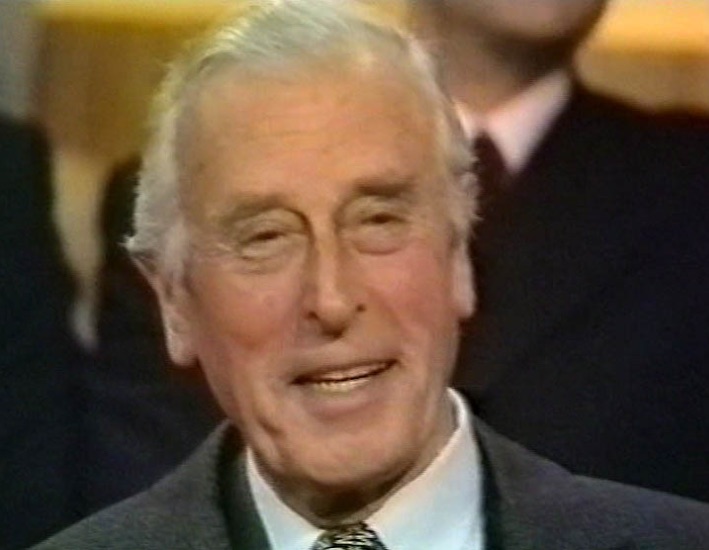
- The first hour long edition of This Is Your Life, the first to include a commerical break and the first to feature a member of the British Royal family
THIS IS YOUR LIFE - Louis Mountbatten, statesman and naval officer, was surprised by Eamonn Andrews in the foyer of Thames Television's Euston Road Studios, having been led to believe he was there to view a documentary as part of his daughter's birthday celebrations.
Louis, who was born Prince Louis of Battenberg in Windsor, attended the Royal Naval College, Osborne, before entering the Royal Navy in 1916. He saw action during the First World War, and after the war briefly attended Christ's College, Cambridge. During the Second World War, he commanded the destroyer HMS Kelly and the 5th Destroyer Flotilla, and saw considerable action in Norway, the English Channel and the Mediterranean.
In August 1943, he became Supreme Allied Commander South East Asia Command and oversaw the recapture of Burma and Singapore from the Japanese by the end of 1945. In March 1947, he was appointed the last Viceroy of India and oversaw the Partition of British India into India and Pakistan. He then served as the first Governor-General of India until June 1948. From 1955 to 1959, he was First Sea Lord, and then served as chief of the Defence Staff until 1965, making him the longest-serving professional head of the British Armed Forces to date.
As a great-grandson of Queen Victoria, a maternal uncle of Prince Philip, Duke of Edinburgh, and second cousin once removed of Queen Elizabeth II, he was the first member of the British Royal family to be featured as a subject on This Is Your Life.
"What do you mean?"
programme details...
- Edition No: 467
- Subject No: 463
- Broadcast date: Wed 27 Apr 1977
- Broadcast time: 8.00-9.00pm
- Recorded: Tue 19 Apr 1977
- Repeated: Mon 26 Dec 1977 1.20pm
- Venue: Euston Road Studios
- Series: 17
- Edition: 27
- Code name: Uncle
on the guest list...
- John Barratt
- Lady Pamela Hicks - daughter
- David Hicks - son-in-law
- Edwina - granddaughter
- Ashley - grandson
- India - granddaughter
- Patricia, Lady Brabourne - daughter
- John Brabourne - son-in-law
- Norton - grandson
- Michael-John - grandson
- Philip - grandson
- Nicholas - grandson
- Timothy - grandson
- Amanda - granddaughter
- Joanna - granddaughter
- Bernard Miles
- John Mills
- Juliet Mills
- letter from Charles Chaplin
- Jackie Coogan
- Capt Charles Drake
- Cdr Alfred Hughes
- Capt Tom Hussey
- Gen Sir Robert Neville
- Danny Kaye
- Wally Kirkwood
- survivors of HMS Kelly - in audience
- Teddy Rowe
- Ralph Scorer
- Fred Garner
- Rocky Wilkins
- Ted Watson
- Teddy Watson
- Dr Harold Scheie
- Viscount John Slim
- Alan Campbell Johnson
- Vera Holst
- members of the Burma Star Association - in audience
- Vera Lynn
- Cecil Hayward
- Harold Payne
- Alan Wood
- Ted Coffey
- Louis Denham
- Stanley Adcock
- Freddy Bloom Filmed tributes:
- Bob Hope
- Douglas Fairbanks Jr
production team...
- Researchers: Maurice Leonard, Lavinia Warner
- Writers: Tom Brennand, Roy Bottomley
- Director: Terry Yarwood
- Executive Producer: Jack Andrews
- Producer: Jack Crawshaw
- names above in bold indicate subjects of This Is Your Life
saluting the armed forces
the special editions
the programme's best kept secrets
a brief biography
the show's fifty year history
the producers who steered the programme's success
the researcher's story
TV Times photo feature
The Daily Mail profiles the programme's history
Ratings slump sounds death knell for This Is Your Life
Press speculation on the future of This Is Your Life
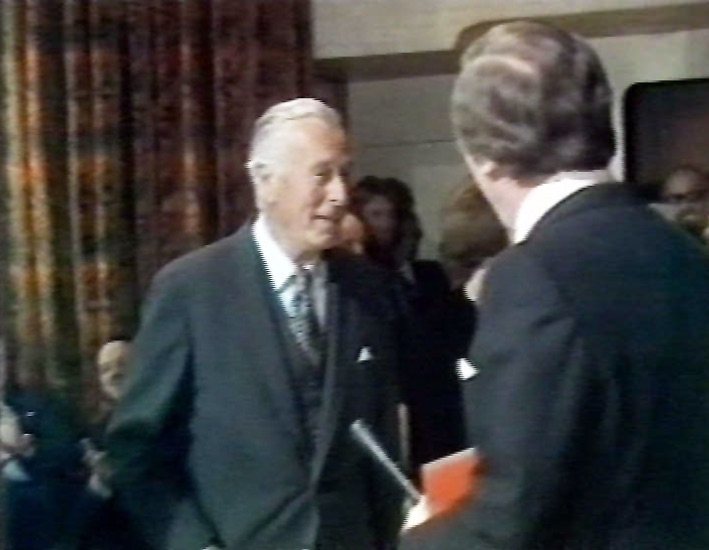
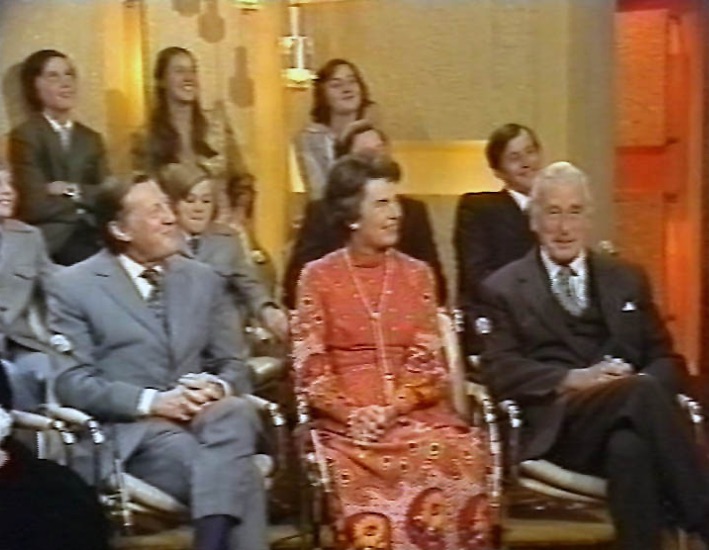
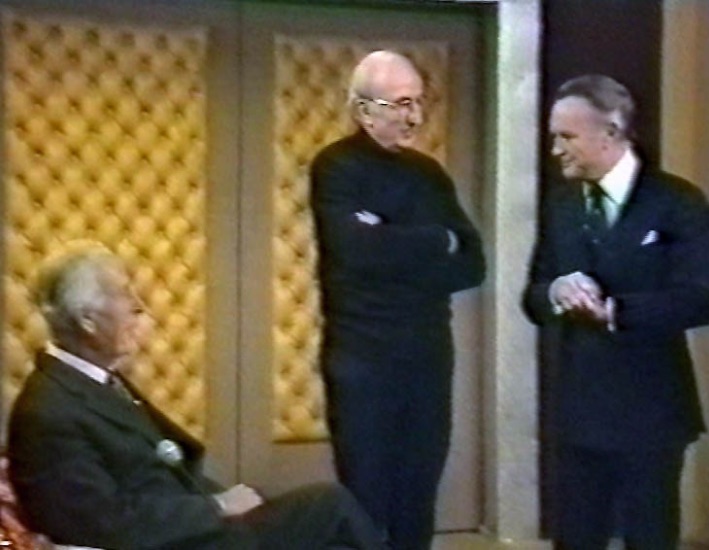
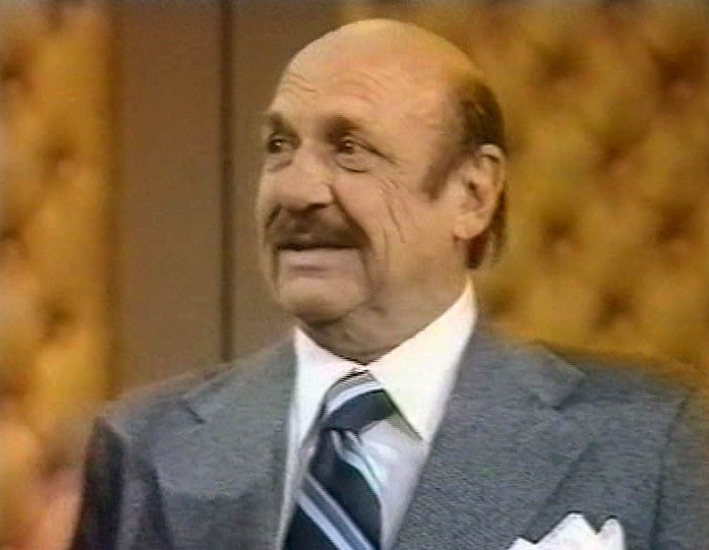

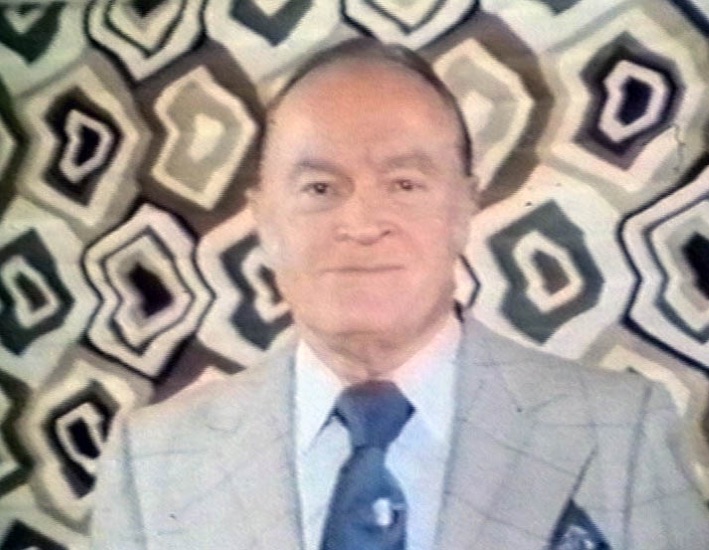
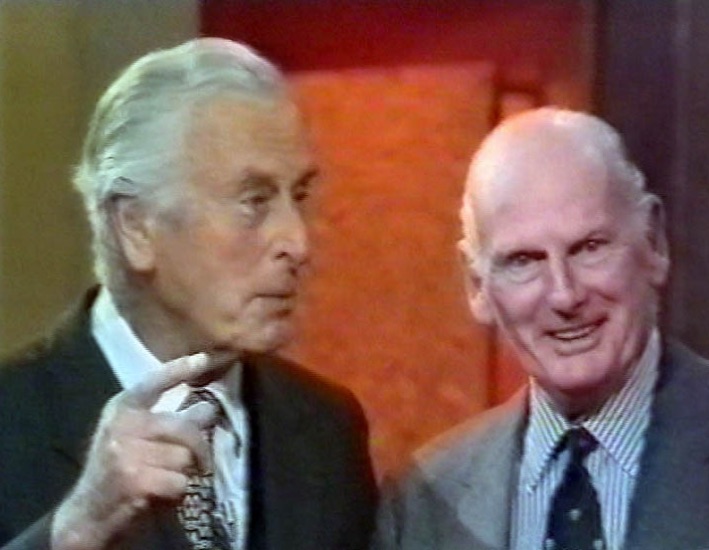
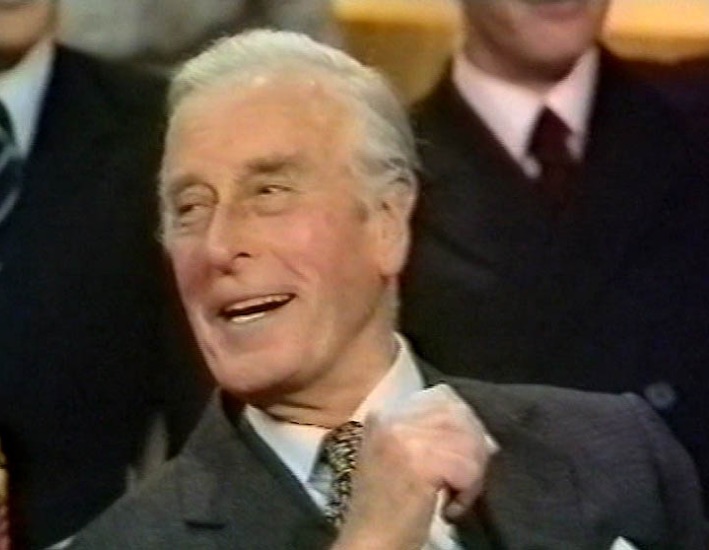

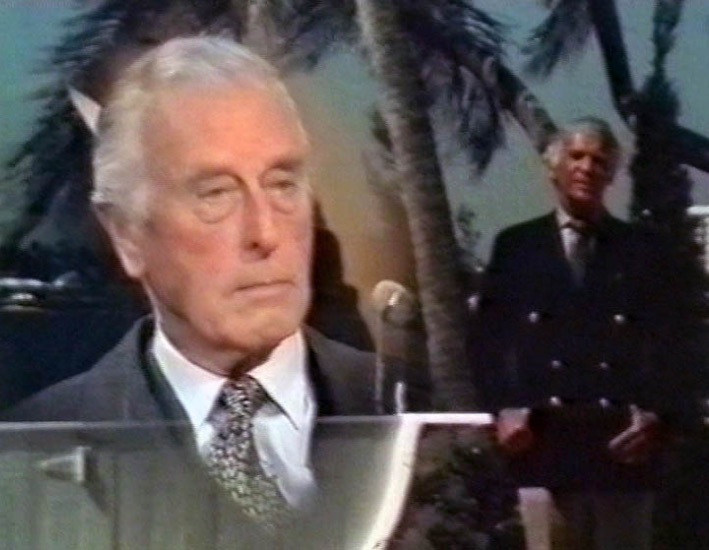
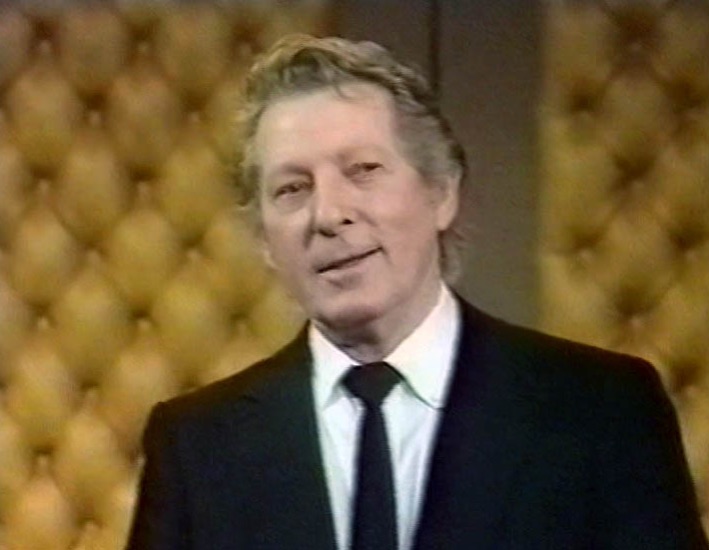
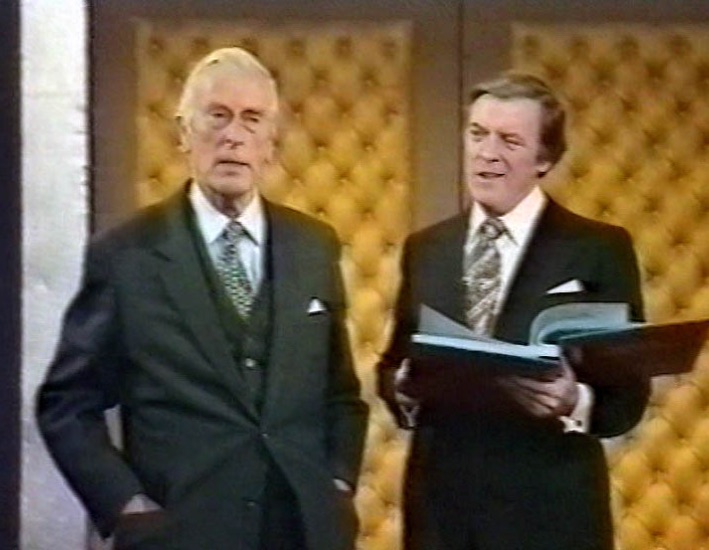

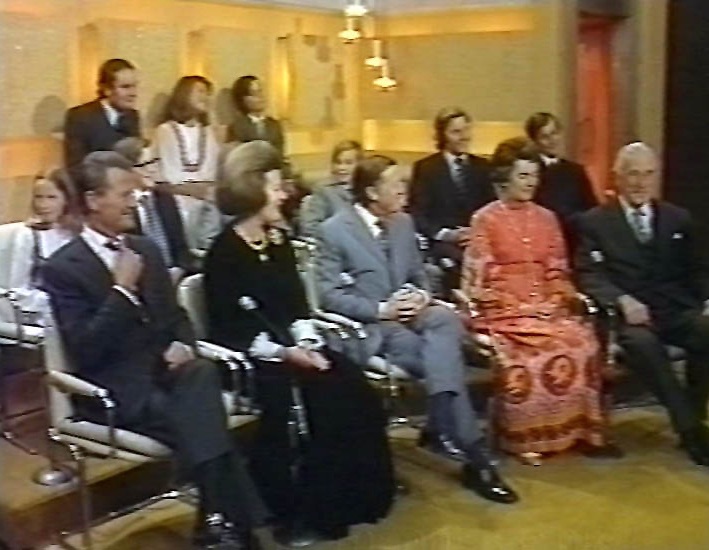
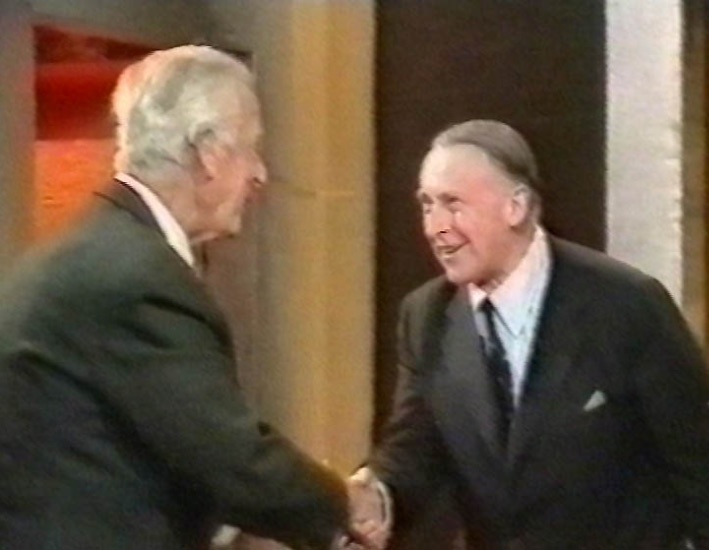
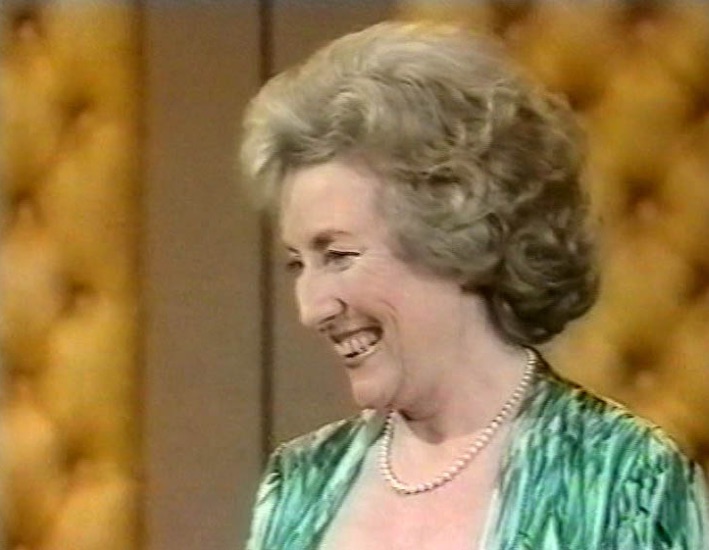
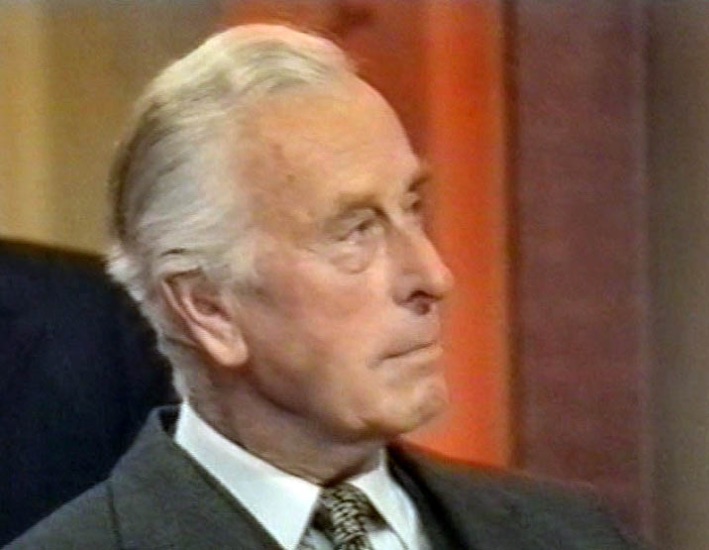
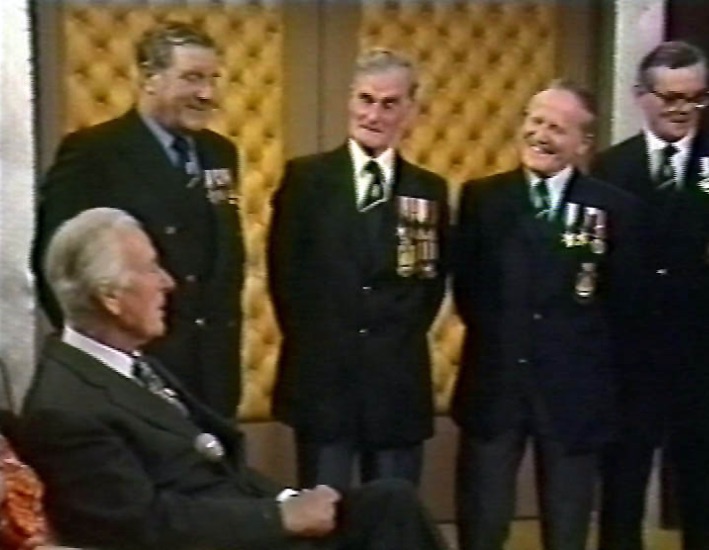
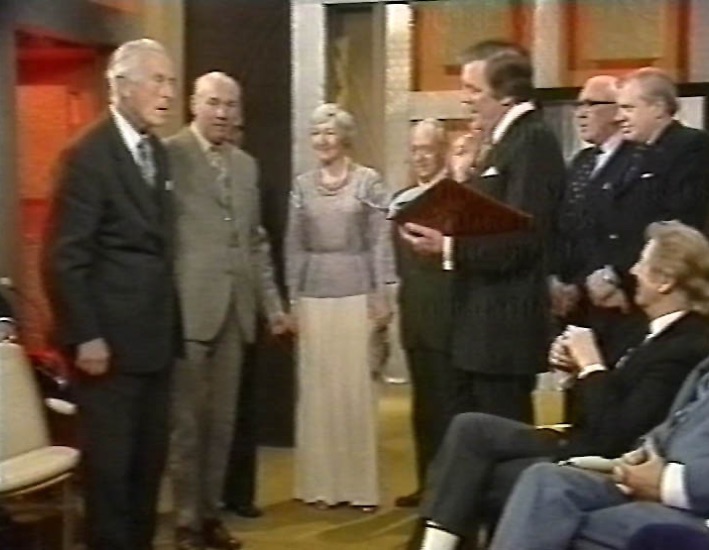
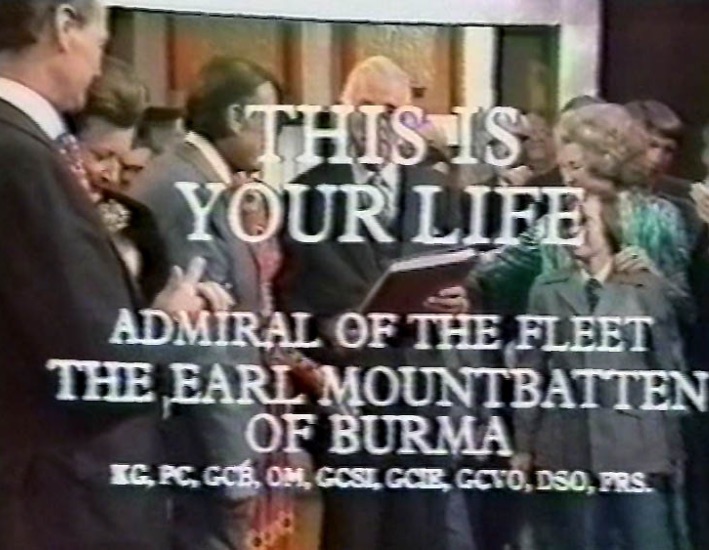
Screenshots of Louis Mountbatten This Is Your Life

I felt sure an ice cold bead of water was running down my spine and I could feel the back of my neck tingling under my collar. It was the bustling foyer of a busy television station, but all I could hear was the sound of a clock ticking away the seconds. Yes, I have faced many similar situations. But, no, they are never the same. Fear is an emotion that strikes new nerves with every visit. This was the moment that not one of the estimated twenty million viewers saw. The moment immediately prior to the arrival at Thames Television, in London, of a man whom, to keep our secret secure, was codenamed "UNCLE".
Yes... Prince Philip's uncle Lord Louis Mountbatten, because tonight Admiral of the Fleet, The Earl Mountbatten of Burma...THIS IS YOUR LIFE
At the moment of confrontation I was flanked by powerful allies: twelve of Lord Mountbatten's own family and his personal secretary. All in on the secret. But my heart stopped when, after I revealed the book, he stepped back and snapped: "What do you mean?"
Those sharp, hazel eyes that had scanned the oceans of war from the bridges of battleships were already scanning the smiling faces of his family. He bit back a word that perhaps I'm glad I didn't quite catch before a broad grin filled his handsome face, his eyes twinkling his amused consent.
I wasn't to know what he was thinking as we walked towards the studio doors and the waiting audience. But I did know what I was feeling. Relief. The relief of one who had faced a firing squad, closed his eyes, heard the shots and then awakened to find it was time to get up and go to another day's work.
But this was no ordinary day. It was the culmination of a year's effort.
The idea was born in the summer of 1976. Returning from a summer break, the eighteen-strong production team behind This Is Your Life were about to begin work on what, for some of them, was their eighth consecutive series.
Apart from Jack and myself, there were other "veterans". Programme consultants and writers, Tom Brennand and Roy Bottomley, were with us when the programme opened on ITV in November 1969 and Kay Bird had joined two years later as programme organiser.
But it was the suggestion of a new boy that put us on a course that led to that dramatic confrontation with the former First Sea Lord.
Terry Yarwood, an experienced director whom I had worked with for many years on the Thames TV programme, "Today", joined the team knowing full well the value of topicality. And what could be more topical in the forthcoming Jubilee Year, he argued, than a member of the Royal Family who, since his birth in 1900, had helped shape this country's history.
We quickly agreed and decided there and then that Terry should make an initial approach.
Our normal routine when someone is suggested is first check out the story as thoroughly as possible. If it stands up as being a likely winner we then approach someone close to the person – wife, husband, brother... For it is their blessing we need. They are the ones best qualified to guess how the person might react if I confronted him or her with The Book. And they are the ones who can guide us in the direction of the all-important surprises in whatever corner of the world they lie.
In this case there was no need to check out the story and no need to waste time in deciding who to contact. The ideal person was Lord Mountbatten's son-in-law, The Lord Brabourne. Terry knew him personally and with screen credits that included that of producer of the film, Murder on the Orient Express and many more, there was no doubting that John Brabourne knew our business. More important, before marrying Lord Mountbatten's elder daughter, Lady Patricia, Lord Brabourne had served as his ADC when he was Supreme Allied Commander, South East Asia. He had known his father-in-law for a long, long time.
But it was still no surprise to us to hear that Lord Brabourne "wanted more time to think".
An understandable reaction and one that we often experience. Waiting patiently is nothing new to us and we were well into the winter season before the next development.
Now, Lord Brabourne wanted a meeting to discuss the matter further. So, just five days before Christmas, Jack, Terry Yarwood and Jack Andrews (no relation – he was Executive Producer) went along to a private address in Knightsbridge.
It was the first of a series of meetings, including one at Lord Mountbatten's own country home in Hampshire, while he was abroad. And like all This Is Your Life business, the meetings were carried out under a code of conduct that stresses trust, discretion and security.
It was over the Christmas holiday that Lord Brabourne disclosed the details of our masterplan to other key members of the family for their approval and – hopefully – help. His wife, Lady Patricia, of course, Norton, eldest of their five sons and heir to Lord Mountbatten's title after his mother, Lady Patricia's youngest sister, Lady Pamela, and her husband, David Hicks, the famous interior designer. In the event, they couldn't have been more helpful and charming. They really entered into the whole spirit of the thing, which is not only to pay tribute but to have fun with it.
But still the biggest question had to be answered: How were we to manoeuvre such a master of planning into a situation where I could spring the surprise? The answer came at a meeting with the family in the New Year. With them was the man whose job it is to know Lord Mountbatten's every movement – his Private Secretary, John Barratt.
John had a diary of his boss's engagements, both at home and abroad for the next twelve months and more. Among the early suggestions was one to surprise Lord Mountbatten at a meeting of the Royal Naval Film Corporation, of which he is President. Another was to fly to Monaco where he was to be a guest at an International Variety Club event.
But it was Lady Pamela who solved the problem with the revelation that one date she knew her father would certainly leave free was in April. Her birthday.
She would suggest that instead of going to a play or show they ask Howard Thomas, of Thames Television, and a friend of Lord Mountbatten if he could arrange a private showing of selected episodes from the television series of Lord Mountbatten's Life and Times which was made in 1967. Her father knew that some of the grandchildren were too young to have seen the series when it was originally shown and she and her sister had often suggested to him that it would be great fun for the younger children to see some of the episodes with him some time. He would not therefore think there was anything odd about the proposal. The plan was perfect.
Now, at least, we knew how to get him to within hailing distance of those studio doors. Next we had to find the people to help tell a story that spanned 77 years.
Senior researcher, Maurice Leonard, helped by Lavinia Warner, got us off to a great start by tracking a dapper and affable gentleman of the sea, Captain Charles Drake. They discovered that Captain Drake had actually started as a cadet at Osborne Naval College on the Isle of Wight on the very same day as Lord Louis sixty-four years earlier.
As the research progressed, the months began to pass like days. And for Maurice and Lavinia several of those days were like nights, spent in one of the windowless bunkers of the Imperial War Museum in Hayes, Middlesex, viewing miles and miles of archive film.
Writers Tom Brennand and Roy Bottomley read no fewer than a million words from other authors before they themselves put pen to paper writing the first draft of the script.
As the guest list grew, so did the problems of Kay Bird. It was her job to see that all the guests got to London, enjoyed every moment of a trouble-free stay and got back home safely. All 180 of them. And from all corners of the world.
Not an easy job at the best of times. But near heartbreaking when, with only days to go, a work-to-rule at London's Heathrow Airport threatened to destroy her meticulously-laid plans and kill off the show.
An overtime ban by maintenance men had caused chaos at what is already one of the world's busiest airports. The delays came first. Then the cancellations. With only five days to go before the show, the situation looked black.
Among our surprise guests who were in danger of being left "stranded" all over the world was a threesome in Hollywood, amazingly united – although they didn't know it – by the fact that each has played a part in the life of our guest of honour. They were all international stars: Danny Kaye, Jackie Coogan and Juliet Mills.
Dame Vera Lynn had agreed to cut short a tour of Canada and the United States to fly back. Lord Louis' own grand-daughter, Joanna, was all set to take a flight from Sydney, Australia, where she had been working. Everybody, it seemed, needed an aeroplane to make the show possible.
That wasn't all. Four thousand miles away in the Bahamas was the rest of the Mountbatten family – including Lord Louis himself. Yes, they had flown off for a holiday with a plan to return four days prior to the show. All but one knowing the reason why the time of their return home was so vital.
A phone call was booked to a contact number in Eleuthera, which Lord Brabourne had left with us in case of emergencies. When, eventually, we got through we left the first of many messages with the local boy who answered, asking him to tell Lord Brabourne to call London urgently.
Each time Lord Brabourne called it was in answer to a different name from London so that we did not risk arousing the suspicion of Lord Mountbatten who, by all accounts had been the life and soul of the holiday party, which, for a brief spell, had included Prince Charles. When the Prince had made it back to London a few days earlier, things were now looking grim for us.
Lord Brabourne told us that the airline already booked could not guarantee the flight that was to bring the family home. Kay Bird immediately double-booked with an American airline. Problem solved... until the next call from Lord Brabourne to say that the local airline they had to take to get them to Nassau to pick up the American flight had gone on strike. Immediately, Kay investigated the possibility of chartering a plane to fly the entire family party from Eleuthera to Nassau to make the connection. But suddenly the clouds cleared. The strike was called off and the family were told they could fly home as planned.
And I feel certain that the twenty million viewers who tuned in to see the result will agree that it turned out to be, as they say, "all right on the night".

Certainly, for me, it was a night of many golden moments. A great story which began with Captain Drake telling us how as a boy cadet, "Dickie" Mountbatten, had stepped forward to ask the then First Lord of the Admiralty on a routine inspection, to increase their Sunday supper ration from a regulation two sardines to three. The First Lord was none other than Winston Churchill.
We discovered an amusing piece of film showing Lord Louis and his cousin David, the Prince of Wales – later King Edward VIII – getting a ceremonial ducking as they crossed the Equator together in 1920.
There was a priceless clip of silent film in which Lord Louis appeared with his late wife Edwina Ashley on their honeymoon in Hollywood. Their co-stars were the legendary Charlie Chaplin and Jackie "The Kid" Coogan. Charlie sent a touching message from his home in Switzerland and Jackie, having beaten the airport problems to fly in from Hollywood, told us how, when he joined the American Air Force, he served with Lord Louis in Burma.
That film had been shot all those years before at Pickfair, the home of Mary Pickford and Douglas Fairbanks. Douglas Fairbanks Jr also joined the programme and spoke to us from Florida. It was a real star-studded night with Bob Hope greeting Lord Louis from Chicago and Danny Kaye flying in to join Sir Bernard Miles, Sir John Mills and his daughter Juliet on stage.
Sir Robert Neville recalled a story from Hong Kong of how Lord Louis, the polo player, scored a goal, unique in the annals of the game when his pony caught a ball in the "fundament", trapped it under its tail and dropped it over the goal line.
And we met Dr Harold Scheie from Philadelphia, whose skill during the Second World War in South East Asia saved Lord Louis the sight of an eye.
But perhaps the most moving moments of all came when Lord Louis met again his fellow survivors from the now legendary HMS Kelly, followed by a handful of ex-prisoners-of-war representing the many thousands of whom his South East Asia campaign had brought freedom. They were men that Lord Louis had refused to forget. Nor will they ever forget, for, as we heard, they all feel a part of the title he chose: "Earl Mountbatten of Burma".

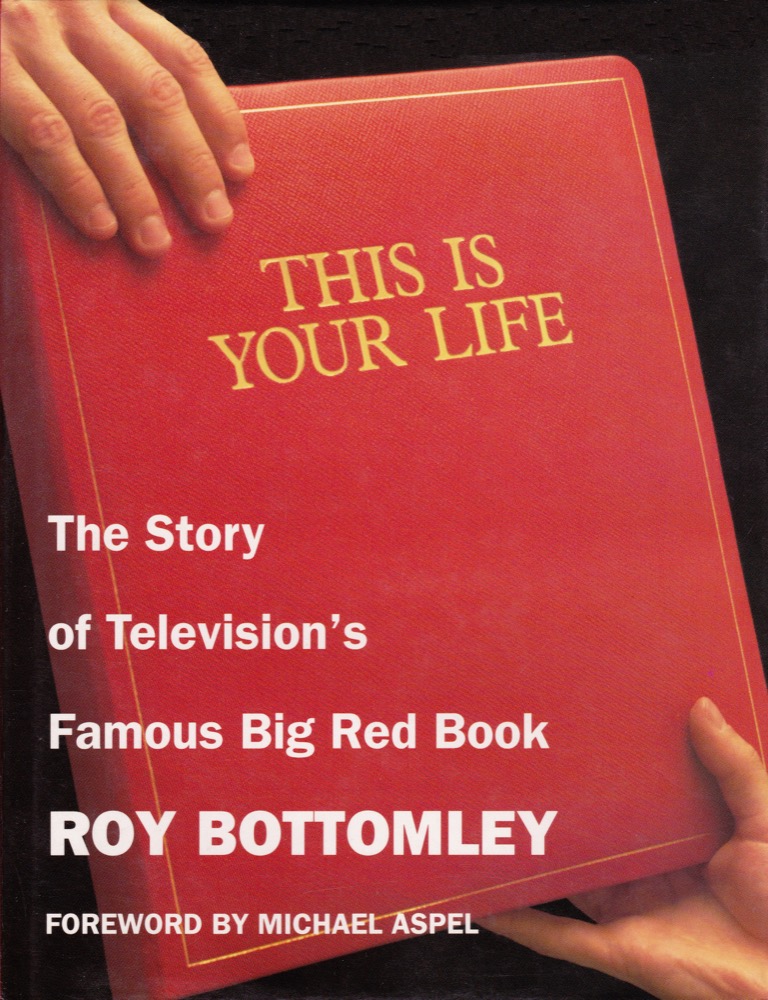
With the select team assigned to work on the Life of Earl Mountbatten of Burma, I reported to a top-secret address in an anonymous Knightsbridge mews. Waiting for us was Lord Brabourne, Lord Louis's son-in-law and former wartime ADC.
The meeting was the first result of 'feelers' we had put out about the possibility of presenting the book to Lord Louis in the Jubilee Year of HM the Queen. Eight months of blood, sweat and tears were to elapse before that actually happened on 19 April 1977.
On that day in 1976 we had to persuade Lord Brabourne to be our co-conspirator on the Life of his father-in-law. Born in 1900, the sixty-third year of the reign of his great-grandmother, Queen Victoria, Lord Louis had helped to shape the country's history. His mother, daughter of Queen Victoria's second daughter, Alice, was also named Victoria.
Veteran of two world wars and last Viceroy of India, his story was the very stuff of Life. Lord Brabourne listened to our early plans and promised he would consult his wife, Patricia, Lord Louis's daughter, and her younger sister, Lady Pamela Hicks.
That meeting had taken place just before Christmas. We were invited back to the same secret address early in the New Year.
This time Lord Mountbatten's daughters were there too. They poured tea and went around the room with sandwiches. As we chatted, their enthusiasm for the project started to mount.
Getting the go-ahead was one thing, but pinning down the globetrotting Lord Louis was another. How could we be sure he would definitely be in London to keep an appointment? It would have to be something special. It was Lady Pamela who came up with the answer.
April 19 was her birthday, and her father would definitely keep that date free to join whatever celebration was planned. One idea they had talked about was a treat for his grandchildren – a showing of some of the episodes of the 1967 television series of Mountbatten's Life and Times. Some of the grandchildren had been too young to watch it at the time.
The natural venue would be the viewing theatre at the studios of Thames Television, where the film was in the vaults. But when the family party arrived, who would be waiting in the foyer but Eamonn Andrews with the Big Red Book. Rarely have I seen Eamonn so nervous as he was that night, and with good reason. When he stepped forward with the book Mountbatten snapped, 'What do you mean?' Then he saw the beaming faces of the dozen members of his family, and himself flashed a smile which meant we could up anchor and sail away with our show.

But it was a programme – watched by twenty million viewers – which nearly didn't happen. We had more than 180 guests arriving from all over the world, including Bob Hope, Danny Kaye, Dame Vera Lynn and Jackie Coogan. And a work-to-rule threat at Heathrow looked likely to throw airline schedules into chaos.
Worse still, four days before our programme, Mountbatten himself was enjoying a family holiday in the Bahamas. It was a relief to know that Lord Brabourne was with him, because, as a successful film producer, he was well acquainted with the vagaries and unpredictability of our business. It helped cool the panic factor.
There were sighs of relief all round when the airport dispute was solved and our guests started to arrive, among them Captain Charles Drake. He had started as 'snotty' – naval slang for midshipman – with Mountbatten, who served in the First World War at sixteen. Captain Drake told how 'Dickie' Mountbatten had asked the First Lord of the Admiralty, on an inspection, if they could have their supper sardine ration increased from two to three. The then First Lord was Winston Churchill. The ration wasn't increased.
We showed film shot by another legend, Charlie Chaplin, of the Mountbattens' honeymoon in 1922. Sir Charles, who was not well enough to travel from Switzerland, sent a photograph of himself with Lord Louis. The caption read, 'Breaking the news to Lord Mountbatten that he is no actor.'
Then he added, 'But a great military commander and peacetime administrator. Hollywood's loss was the world's gain.'
More archive film showed him with his cousin David, Prince of Wales, later King Edward VIII and later still Duke of Windsor, getting the crossing-the-Equator 'ducking'.
Former Hong Kong Governor Sir Robert Neville told of a polo goal scored by Lord Louis, which was 'unique in the annuls of the game'. The ball had whizzed past him and was caught 'in the fundament' by Mountbatten's pony. Lord Louis rode over the goal-line, the pony lifted its tail, dropped the ball and a goal was allowed.
A moving moment came with the arrival of survivors of the destroyer HMS Kelly, who had presented its torn and bullet-riddled flag to their skipper. Noel Coward had based his film In Which We Serve on their exploits, giving a break to two young hopefuls who also came on the show – Sir Bernard Miles (later Lord Miles) and Sir John Mills.
On 23 May 1941, the Kelly was attacked by twenty-four enemy dive-bombers and rolled over completely. A survivor, Fred Garner, turned to the first other member of the crew he spotted in the water and said, 'Funny how scum always rises to the top.' Then he realised it was his skipper, Lord Louis.
Lastly came a few survivors of the Japanese POW camps, freed by Mountbatten's South-East Asia campaign. When he visited the notorious Changi gaol, the prisoners, though starving and in rags, had formed a guard of honour for him. They were the 'forgotten army' Mountbatten had refused to forget. And all felt a part of the title he chose: Earl Mountbatten of Burma.
Researcher Maurice Leonard (nowadays Michael Barrymore's producer) waited with eager anticipation at Heathrow for the arrival of Hollywood legend Danny Kaye, flying in for the Lord Mountbatten Life.
Maurice, a film buff and great, outgoing enthusiast, couldn't wait to spot his hero coming through the arrivals barrier, followed by a porter with his luggage. Maurice greeted the star effusively, delighted to meet him at last, his limousine was waiting etc. Kaye didn't so much as look at him.
Tip the ******* porter,' he grunted.

Secretly, Eamonn had thought of the Queen Mother as a potential subject. If he succeeded he knew he would have the greatest Royal show of the lot. However, when a Life researcher made an approach the answer was not unexpected. 'The time was not appropriate.'
The closest he had come to the Queen Mother was Lord Mountbatten, when he surprised him on a Tuesday evening in April 1977. As producer Jack Crawshaw would remark, 'It's taken us eight years to get any member of the Royal Family and it seemed most fitting in the Jubilee Year to try to approach Lord Mountbatten. We knew that he had a sense of humour and his family seemed to agree that the idea of doing the programme would appeal.' Eamonn was in no doubt about the merits of his first Royal programme: 'It was most exciting for me and the team. In fact, the best This Is Your Life we ever did. For me, it was personally a night of many golden memories - and one of course of intense relief. I know my heart stopped when I revealed the Life book to Lord Mountbatten.'
TERRY YARWOOD is tall, lean and earnest. Quietly-spoken, he instantly strikes one as the kind of man capable of keeping a secret forever, so he was an invaluable asset to the This Is Your Life eighteen-strong team. For a number of years he had worked as director on Today and came to know Eamonn. 'We hit it off very well,' Yarwood remembers. 'I enjoyed my stint on the programme.'
On this September morning in 1976 he joined Malcolm Morris and Maurice Leonard, two of the Life team at the weekly production conference at the Thames TV studios in Teddington. As usual, Eamonn sat at the top of the table. The team were about to begin work on what was to be their eighth consecutive series.
Terry Yarwood had not long joined the programme, but he already noted a number of celebrities he thought would make exciting subjects. Heading the list was Lord Louis Mountbatten. Although he had heard that Eamonn was anxious to surprise the Queen Mother he felt that was extremely unlikely to happen. It would be a Royal breakthrough if they could hand the red book to Lord Mountbatten.
For a while he listened as Eamonn suggested likely subjects. Then in a quiet voice, he said, 'What d'you say to Lord Mountbatten?'
The others in the room looked at Yarwood, then up the table to ascertain Eamonn's reaction. It wasn't enthusiastic. 'You'll never get him, Terry,' he said calmly.
'I think it's worth trying,' Yarwood persisted. 'It's a wonderful story.'
'I agree,' Eamonn said. 'It's clearcut. I mean we don't have to waste time in deciding who to contact. To me, the ideal person is Mountbatten's son-in-law, Lord Brabourne.'
He shrugged, as he added, 'I'd like to think we can get him but as I say I'm not so sure.'
Yarwood sensed that Eamonn was already showing slight enthusiasm. He reckoned the Mountbatten story would be ideal for the following year, Jubilee Year, and it would be nice to have a member of the Royal Family on the show.
The suggestion was discussed for a while at the table and before long Eamonn agreed with Yarwood that it was perhaps worth the effort. If anyone had cared to ask Brian Tesler, he would have said, 'Lord Mountbatten adores publicity. He would be only too delighted to accept the red book'.
Maurice Leonard was in agreement that the Mountbatten Life would be enormously exciting because of his involvement in two wars and his connection with India, and, of course, the HMS Kelly and its crew. But he also knew from experience that it was hard to influence Eamonn unless you presented a very convincing reason for doing something. As regards the choice of subjects for Life, he exercised a total veto. Therefore he was scarcely prepared when Eamonn said, 'Maybe Terry is right. If we can get Mountbatten I think we should go ahead.'
Yarwood was delighted. He saw the programme not only as the biggest challenge ever faced by the Life team, but also something fantastic for Eamonn. In subsequent weeks he kept Eamonn informed of his progress. 'I think we can set it up,' he told him. 'Lord Brabourne seems interested enough to consider the idea seriously. But he wants more time to make personal enquiries.'
Eamonn was prepared to wait. The team had noticed that be was becoming 'quite excited' about the prospect of surprising Lord Mountbatten. He was impressed by Terry Yarwood's dedicated approach. Shortly before Christmas Lord Brabourne, who was married to Lord Mountbatten's elder daughter, Lady Patricia, asked for a meeting with a few of the Life team, including Terry Yarwood, 'It was rather hush hush,' remembers Yarwood. 'We met at a private address in Knightsbridge and Lord Brabourne put certain questions to us about the guests we planned to invite and when exactly it was proposed to do the programme. He was polite and helpful, but stressed that he hadn't told any of the family yet and again asked for more time to consider the matter. Before he left the room, another meeting was arranged.'
After Christmas, when Eamonn returned from a short holiday at home in Ireland, he learned that Lord Brabourne had broken the news to his family and they appeared 'quietly enthusiastic' about the plan to surprise Lord Mountbatten. However, Terry Yarwood knew that their biggest problem was finding a way to spring the surprise. It was common knowledge that Mountbatten spent a good deal of time abroad and it was up to them to find out when he would be home.
They had to wait until the New Year for an answer. As Eamonn recalled, 'Finally it was Lady Pamela Hicks who solved the problem for us with the revelation that one date she knew her father would certainly leave free was in April - her birthday - she would suggest that, instead of going to a play or show, they ask Howard Thomas, of Thames Television, and a friend of Lord Mountbatten, if he could arrange a private showing of selected episodes from the television series of Lord Mountbatten's Life and Times, which was made in 1967. Her father knew that some of the grandchildren were too young to have seen the series when it was originally shown and she and her sister had often suggested to him that it would be great fun for the younger children to see some of the episodes with him some time. He would therefore not think there was anything odd about the proposal.'
Terry Yarwood agreed with Eamonn that the plan could not be better. 'We all knew that it was hard to get Eamonn enthusiastic about some things,' he recalls, 'but he was now full of enthusiasm, though as usual somewhat cautious until he had finally sprung the surprise. There was a lot of work still to do, some more problems to be solved. We had to find the people who would piece together the story and make it exciting television.'
By now Maurice Leonard was busy on the project. It had been a lifelong ambition of his to be part of the This Is Your Life programme and he was now thrilled to be working on the biggest show yet. As Senior Researcher, he was faced with some painstaking work, but he was loving the challenge. 'We all knew we were onto something exciting and wanted to make the programme one of the best ever at Thames. It was my job to come up with the information so that the show could be properly shaped. I was helped by Lavinia Warner and both of us worked long hours, often at the Imperial War Museum in Hayes, Middlesex, looking at miles of archive film.'
It was Kay Bird's job to ensure that all the guests got to London and had an enjoyable stay. It was a mammoth task for her, as she planned for each of the 180 guests who would be arriving from all parts of the world. She was not helped by a threat of an overtime dispute at Heathrow Airport. Coming from Hollywood were Bob Hope, Jackie Coogan, Danny Kaye and Juliet Mills. Dame Vera Lynn had agreed to cut short a tour of Canada and the United States to fly back. Lord Mountbatten's own grand-daughter, Joanna, was to arrive from Sydney, Australia. Four thousand miles away in the Bahamas were the rest of the Mountbattens, including Lord Mountbatten.
Terry Yarwood admitted that even he had not visualised the true scale of this Life programme he had first suggested at the production conference six months before. 'Every day the story seemed to grow in dimension,' he recalls. 'It called for very strict security and secrecy to keep the secret intact. A last minute news leak would be a shattering blow to us all, especially for Eamonn who became involved in almost every aspect of the planning.'
The operation was moving smoothly, save for one serious worry. Lord Brabourne informed them that the airline already booked could not guarantee the flight that was to bring the Mountbatten family home. Kay Bird immediately double-booked with an American airline.
On the evening of the programme, 19 April, 1977, Eamonn smoked more cigarettes than usual and seemed nervous as pick-up time approached. Knowing that twenty million viewers probably would be watching the show, he earnestly hoped that nothing would go wrong. His introductory words were: 'In a few minutes from now I'll know whether we're going to succeed in telling the story of a man whose courage and daring in the war and whose renowned achievements and feats have significantly contributed to the shaping of Britain's history...'
The dramatic pick-up was planned to take place at the start of the Mountbatten celebrations in the Thames Television studios. It was to be an hour-long programme. When the Earl arrived he was welcomed by Howard Thomas, Chairman of Thames Television. Suddenly, Eamonn stepped forward to say, 'Let me join in the happy birthday occasion of your daughter, Lady Pamela Hicks. And my thanks to Lord Brabourne and all the family because they agreed to the postponement of the film so that I can say, Admiral of the Fleet, Lord Mountbatten of Burma... Tonight, This Is Your Life.'
Lord Mountbatten's face showed instant surprise and a slight hint of confusion. 'What do you mean?' he replied, but realising that Eamonn was about to present his life he walked with him into the studio. He was greeted by prolonged applause. For the first time that day Eamonn looked relaxed. Later he would say, 'My heart stopped when, after I revealed the book, Lord Louis stepped back and snapped, "What do you mean?" I wasn't to know what he was thinking as we walked towards the studio doors and the waiting audience. But I did know what I was feeling. Relief. The relief of one who had faced a firing squad, closed his eyes, heard the shots and then awakened to find it was time to get up and go to another day's work. But this was no ordinary day. It was the culmination of eight months' effort.'
A look of relief also showed on the face of Terry Yarwood and researcher Maurice Leonard. They had shared Eamonn's anxiety and were now relieved that the show was under way. It promised to live up to their highest expectations.
Over the next hour there would be moving moments as well as sad ones. When Bob Hope was introduced, he quipped, 'I hope you're enjoying the evening, Earl. Otherwise Eamonn gets to walk the plank.' Danny Kaye remarked, 'I wish you could have seen your face, Lord Louis, when Eamonn said "This Is Your Life". You were on the verge of saying something terribly rude.' But perhaps the most moving moment of all arrived when Lord Mountbatten met again his fellow survivors from the now legendary HMS Kelly. Reading from the red Life book, Eamonn recalled the days when Lord Louis was captain of the ship and how in a sea battle during the war it was almost shipwrecked by the enemy. 'But you refused,' he told Mountbatten, 'to abandon ship and this inspired Noel Coward to make In Which We Serve.'
For sustained effort, Terry Yarwood thought it was Eamonn's 'finest hour'. As he recalled, 'He was at the top of his form and the whole programme flowed almost effortlessly.' To Maurice Leonard, it was very exciting and demonstrated what one could do with an hour-long Life programme. 'Although people thought that we should be doing more long programmes this was only possible when the story was of epic quality.'
Eamonn would say, 'It was the best This Is Your Life we ever did.'
The programme pleased Mountbatten. He later requested Thames to send a copy of the Life to the Buckingham Palace archives for posterity. It was the first time such a request had been made.
Evidently the programme caught the imagination of viewers as well for the Life team received a number of congratulatory messages. Fleet Street devoted a good deal of space to the programme and praised Eamonn's deft handling of Lord Mountbatten and the numerous guests. As one paper pointed out, This Is Your Life trapped its most illustrious victim last night … Earl Mountbatten. And viewers were told of a new side to the seventy-six-year-old uncle of Prince Philip... as the man who nearly became a film star. Veteran film star, Jackie Coogan, revealed how he had made a home movie with Lord and Lady Mountbatten and Charlie Chaplin in Hollywood in the twenties. The couple could easily have become film stars if they'd stayed in Hollywood, Coogan told the audience. 'After all, they had the looks and the glamour – that's the main thing.'
Later, Eamonn referred to this episode, when he wrote: 'We used a priceless clip of silent film in which Lord Louis appeared with his late wife, Edwina Ashly, on their honeymoon in Hollywood. Their co-stars were Charlie Chaplin and Jackie Coogan. Charlie sent a touching message for our Life show from his home in Switzerland and Jackie, having beaten the airport problems to fly in from Hollywood, told us how, when he joined the American Air Force, he served with Lord Louis in Burma.'

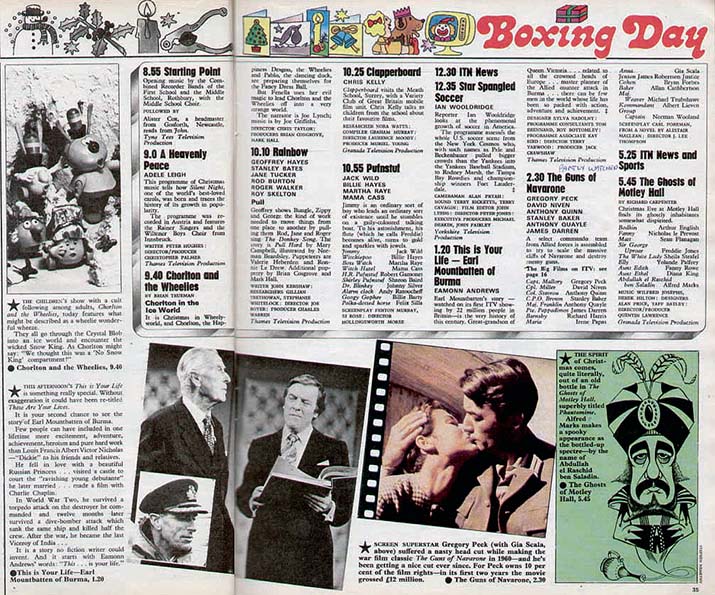
TV Times 26 December 1977
This afternoon's This Is Your Life is something really special. Without exaggeration it could have been re-titled These Are Your Lives.
It is your second chance to see the story of Earl Mountbatten of Burma.
Few people can have included in one lifetime more excitement, adventure, achievement, heroism and pure hard work than Louis Francis Albert Victor Nicholas – "Dickie" to his friends and relatives.
He fell in love with a beautiful Russian Princess... visited a castle to court the "ravishing young debutante" he later married... made a film with Charlie Chaplin.
In World War Two, he survived a torpedo attack on the destroyer he commanded and twelve months later survived a dive-bomber attack which sank the same ship and killed half the crew. After the war, he became the last Viceroy of India.
It is a story no fiction writer could invent. And it starts with Eamonn Andrews' words: "This... is your life."
This Is Your Life – Earl Mountbatten of Burma, 1.20

The Guardian 28 April 1977
TELEVISION
Nancy Banks-Smith
THE CAPTURE of Lord Mountbatten for This Is Your Life was an old-fashioned scoop and, as a reunion, not untouching by any means. Full of naval reprimand of the who-pinched-the-steering wheel? variety and naval repartee: "As I came up I said, 'Isn't it funny how the scum always rises to the surface.' Little did I know, for we were all covered with oil, that it was..." "You knew bloody well who it was!"
The Mountbattens do indeed have an inbuilt buoyancy but This Is Your Life always does its subject less than justice by implying that the water was lovely and warm. I don't doubt, for instance, that it was the wounding insult to his First Sea Lord father, forced out by the German witch-hunt of the First World War which drove him to become First Sea Lord himself.
However, an hour passed very affably, punctuated by Lord Mountbatten slapping his right knee for every new arrival: "Good God, old boy," or "Very nice of yer." One waited... Good God, she wouldn't, would she? No, she wouldn't. But Dame Vera Lynn did.
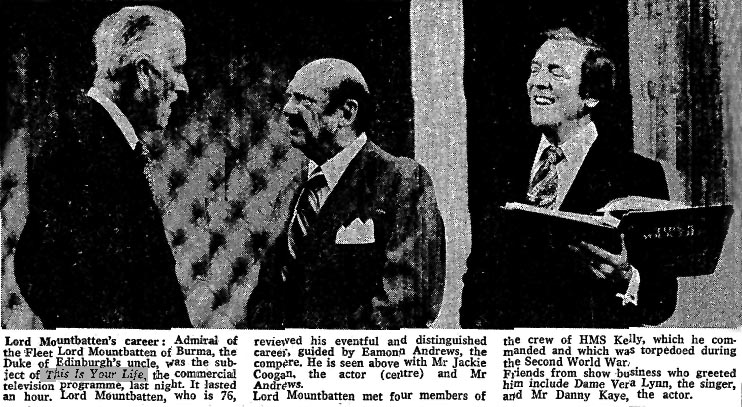
The Times 28 April 1977
Lord Mountbatten's career: Admiral of the Fleet Lord Mountbatten of Burma, the Duke of Edinburgh's uncle, was the subject of This Is Your Life, the commercial television programme, last night. It lasted an hour. Lord Mountbatten, who is 76, reviewed his eventful and distinguished career, guided by Eamonn Andrews, the compere. He is seen above with Mr Jackie Coogan, the actor (centre) and Mr Andrews.
Lord Mountbatten met four members of the crew of HMS Kelly, which he commanded and which was torpedoed during the Second World War.
Friends from show business who greeted him include Dame Vera Lynn, the singer, and Mr Danny Kaye, the actor.
Series 17 subjects
Frankie Howerd | Wilfred Hyde-White | John Blashford-Snell | Mervyn Davies | Pam Ayres | Ivy Benson | Jim WicksJoss Ackland | John Inman | Patrick Cargill | Sheila Hancock | Tom O'Connor | Florence Priest | Tony Britton | Molly Weir
Anthony Quayle | Alfred Pavey | Michael Denison | Mary Chipperfield | Leonard Sachs | Cyril Fletcher | Matt Monro
Tony Greig | John Frost | Brian Rix | Alberto Semprini | Louis Mountbatten